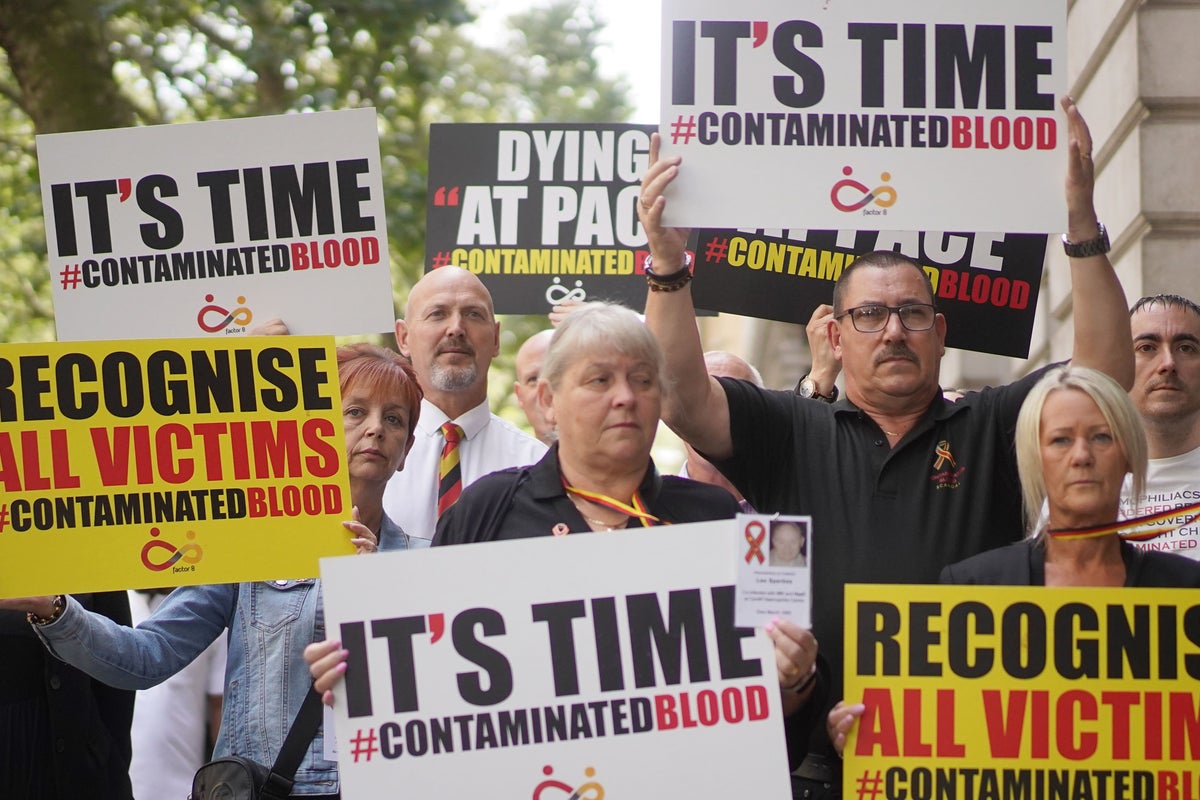
Delays to compensation for victims of the infected blood scandal have had “devastating” impacts, a leading charity has said as the probe into the disaster prepares to publish a special report on the impact.
Victims of the scandal, which has been dubbed the worst treatment disaster in the history of the NHS, have described their “frustration” with waiting.
A report into the timeliness of compensation for those infected and affected is due to be published on Wednesday, following additional hearings of the Infected Blood Inquiry.

On Sunday the Cabinet Office announced that it was “unlocking administrative barriers” to help the compensation body “speed up payments to victims”.
Speaking ahead of the publication of the new Inquiry report, Kate Burt, chief executive of the Haemophilia Society, said: “Delays and uncertainty about compensation continue to have a devastating mental and physical impact on the infected blood community.
“We hope the Infected Blood Inquiry’s report on the government’s handling of compensation will help to resolve remaining concerns about the scheme as well as maintain pressure to deliver fair payments as quickly as possible.”
Brendan West, who was given infected blood in the 1970s, told the PA news agency that many members of the infected blood community felt “frustrated” while waiting to be called forward for compensation.
The former soldier lost his leg in 1979 and was given blood transfusions while at a British military hospital in Germany where his leg was amputated. Four decades later, he discovered that the blood he was given was infected with Hepatitis C.
The 64-year-old from Farnborough, Hampshire, now suffers from liver cirrhosis which causes exhaustion.
He said he hoped the Government will take “fair and informed action” after the report is published.
“I’m fortunate enough to now in the process of going through compensation,” he said.
“I have no idea when I will be made an offer but at the moment I think I am being treated fairly.”
He added: “As you’re aware people were very frustrated with waiting but it seems to me that the IBCA have bought on a load more staff and they have been inviting people to apply for compensation in greater numbers.
“There is still a frustration from a lot of the community that they’re having to wait, particularly those that are affected rather than infected.
“I hope the Government will look at the report recommendations and take fair and informed action on them.
“I think there will be huge backlash if those recommendations are either ignored or discarded.”
We’ve published our latest compensation figures today - these are accurate as of 1 July 2025.
— Infected Blood Compensation Authority (@IBCA_UK) July 3, 2025
We will continue to publish updated figures every two weeks.
Click the link to see the latest figures: https://t.co/CISQSHwRQ0 pic.twitter.com/KRWbpXunBg
More than 30,000 people in the UK were infected with HIV and hepatitis C after they were given contaminated blood and blood products between the 1970s and early 1990s.
More than 3,000 people have died as a result, and survivors are living with life-long health implications.
The Infected Blood Inquiry published its main report on the scandal in May last year, and a compensation scheme was announced a day later.
But in the same week a general election was called and officials from the Infected Blood Compensation Authority (IBCA) have described how in the early days of the organisation it consisted of two men, a laptop and a phone.
Some £11.8 billion has been allocated to compensate victims, administered by the IBCA.
As of July 1, some 2,043 people have been asked to make a claim, and 460 people have had their compensation paid totalling more than £326 million, according to IBCA figures.
On Sunday, the Cabinet Office said that it will “reduce the administration and process delays” victims are facing, meaning the IBCA will “be able to deliver services quickly, and require different supporting information from claimants”.
Des Collins, senior partner at Collins Solicitors and adviser to 1,500 victims of the scandal, said: “In our view there has already been some recent progress in the number of infected people being invited to apply for compensation.
“However it remains the case that those affected – by virtue of the fact they lost husbands, fathers, sons and family members to infected blood/blood products – are still in the dark about the route to compensation for them.
“There has been absolutely no guidance on timeframes for when they will be invited to apply – these members of the community deserve better.
“Whilst the path to compensation for the infected blood community has been far from smooth, improvements can still be made.”







